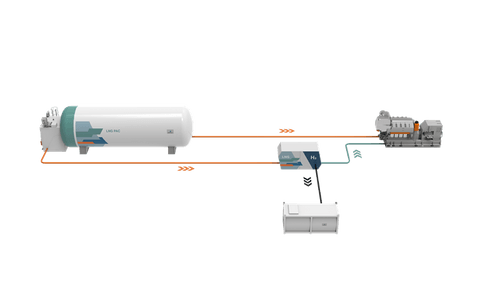California has reached an historic agreement with the nation’s leading passenger and cargo airlines to dramatically accelerate the use of sustainable aviation fuel for flights within the state, according to a news release.
In an announcement made last week at San Francisco International Airport, the California Air Resources Board (CARB) and Airlines for America (A4A), an industry trade organization representing nearly a dozen major airlines, committed to a goal of increasing the availability of sustainable aviation fuel (SAF) for use within California to 200 million gallons by 2035, an amount that would meet about 40% of intrastate travel demand – a more than tenfold increase from current levels.
Sustainable aviation fuel is a low-carbon alternative to petroleum-based jet fuel. It is made from renewable biomass and/or waste. The agreement accelerates solutions to California’s climate and air quality goals by partnering with the aviation industry in emissions reduction efforts, and it supports a commitment by the major U.S. airlines to achieve net-zero carbon emissions by 2050, which will require completely transitioning from conventional petroleum-based jet fuel to sustainable alternatives.
This collaboration is an example of California’s partnerships with industry to move toward a clean air future, and one that was made possible by the development of alternative fuels spurred by the state’s Low Carbon Fuel Standard program that provide the industry lower-carbon, sustainable options.
“California and the aviation industry are joining forces to tackle emissions head-on,” said Governor Gavin Newsom. “We’ve put the tools in place to incentivize cleaner fuels and spur innovation, creating opportunities like this to radically change how Californians can travel cleaner. This is a major step forward in our work to cut pollution, protect our communities, and build a future of cleaner air and innovative climate solutions.”
“California is once again demonstrating that smart climate action is good for the environment and good for business,” said CARB Chair Liane Randolph. “This partnership with the nation’s leading airlines brings the aviation industry onboard to advance a clean air future and will help accelerate development of sustainable fuel options and promote cleaner air travel within the state.”
“A4A is pleased to launch a partnership with CARB focused on protecting the environment, reducing emissions, and increasing the use of SAF in California and across the country,” said Kevin Welsh, Vice President of Environmental Affairs and Chief Sustainability Officer at Airlines for America. “This partnership reflects the type of collaboration between government and the private sector that is necessary to achieve ambitious climate goals, and the agreement announced today reflects the strength of our commitment to a cleaner, more sustainable future for air travel. We’re excited to work with CARB and other SAF stakeholders to further our industry’s efforts to achieve net-zero carbon emissions by 2050.”
A4A’s members include Alaska Airlines, American Airlines, Atlas Air Worldwide, Delta Air Lines, FedEx, Hawaiian Airlines, jetBlue Airways, Southwest Airlines, United Airlines, UPS, and associate member Air Canada. Key goals of the Sustainable Aviation Fuel Partnership include:
- CARB and A4A will work together with sustainable aviation fuel producers, aviation stakeholders, and the federal government to ensure that at least 200 million gallons of cost-competitive options are available for use by airlines within California by 2035.
- To achieve these goals, CARB and A4A will work together to identify, evaluate, and prioritize new policies and actions, including incentives for investment and timely permitting to help accelerate the availability and use of sustainable aviation fuels for intrastate flights in California.
- The partnership will establish a Sustainable Aviation Fuel Working Group of government and industry stakeholders that will meet annually to report progress and address barriers to meeting these goals.
- CARB staff will create a public website that will display the latest information on the availability and use of conventional jet fuel and sustainable aviation fuel within California, as well as details on relevant state and federal incentives and policies.
In addition to bolstering climate action in California, this agreement supports and builds on the climate goals outlined in the federal government’s Sustainable Aviation Fuel Grand Challenge, a national initiative to develop a comprehensive strategy for scaling up new technologies to produce sustainable aviation fuels on a commercial scale.








